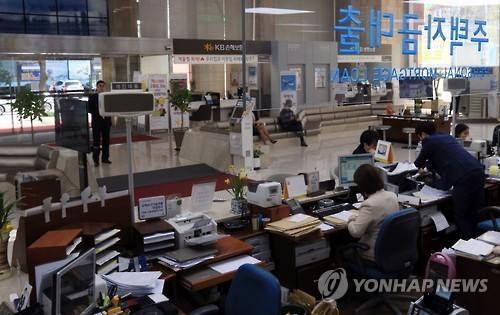South Korea's financial authorities on Thursday said they will apply stricter lending rules in the nonbanking sector starting in the second half of the year to keep rising household debts in check.
The Financial Services Commission will have insurance companies apply strengthened rules when extending loans to customers starting in July, the FSC said in a statement. Local banks began to adopt similar lending rules in February.

"We will start with insurers in the nonbanking sector. And then we are planning to gradually introduce a stricter evaluation system (before approving loans to customers) at other nonbanking lenders," said Deputy Director Ryu Seong-jae in charge of the lending rules at FSC.
Nonbanking lenders include savings banks, consumer financing firms, MG Community Credit Cooperatives and the National Agricultural Cooperative Federation.
The announcement comes hours after the Bank of Korea released the country's accumulated household debt figures for the January-March quarter.
Household debt jumped 11 percent to a record 1,223.7 trillion won ($1.035 trillion) in the first quarter from 1,098.3 trillion won a year earlier, according to BOK data.
"Lower-credit customers had no other option but to seek higher-rate loans from nonbanking lenders as they were denied access to loans at banks," a BOK official said. "It pushed up overall household debt further in the first quarter."
In the banking sector, the FSC said it will make stepped-up efforts to get household debts under control.
The financial regulator plans to increase the share of fixed-rate, amortizing loans in the ongoing loan conversion program.
It aims to raise the share of fixed-rate loans to 40 percent by the end of 2016 from 35 percent a year earlier while increasing that of amortized loans to 45 percent from 35 percent, the statement said.
An amortized loan is a loan with scheduled periodic payments of both principal and interest. (Yonhap)












![[Today’s K-pop] BTS pop-up event to come to Seoul](http://res.heraldm.com/phpwas/restmb_idxmake.php?idx=644&simg=/content/image/2024/04/17/20240417050734_0.jpg&u=)




![[KH Explains] Hyundai's full hybrid edge to pay off amid slow transition to pure EVs](http://res.heraldm.com/phpwas/restmb_idxmake.php?idx=652&simg=/content/image/2024/04/18/20240418050645_0.jpg&u=20240419100350)

![[Today’s K-pop] Zico drops snippet of collaboration with Jennie](http://res.heraldm.com/phpwas/restmb_idxmake.php?idx=642&simg=/content/image/2024/04/18/20240418050702_0.jpg&u=)